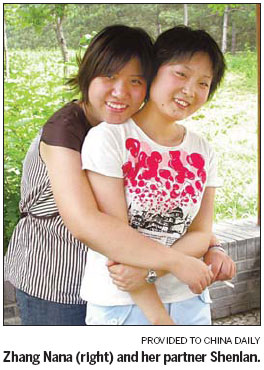Lesbian couple get married
Zhang Nana (not her real name), a 32-year-old working for a Beijing-based magazine, and her 58-year-old parents are caught in a crisis that threatens to tear apart the family.
But it was only in October 2006 that her parents attended the banquet that gathered together more than 100 relatives and friends, to celebrate their daughter's marriage to a good-looking, 31-year-old university lecturer surnamed Wang.
|
|
"Why are you failing me?" questions her mother.
"Can you not try and change?" they ask, worn out by their crying, disbelief and disappointment.
Although China removed homosexuality from its list of mental illnesses in 2001, people like Zhang's parents continue to see it as an abnormity that can be corrected.
"How can I?" counters Zhang.
"I haven't told them that I've been living with my female partner since 2004.
"They believe I've 'degenerated' into same-sex love because of troubles in the marriage. But Wang, too, is a gay.
"Our marriage was a cover from the very beginning," she adds.
Zhang shares a loving relationship with Shenlan (not her real name), 29, who was a bridesmaid at her wedding.
They discovered one another while co-renting an apartment in the capital's Wangjing area. Knowing that their parents would never be able to understand or accept their love, they kept their relationship secret.
"My parents are a happy couple with traditional ideas, who expect me complete this picture of bliss with a grandchild," Zhang says.
As her love for Shenlan deepened, she began to think of the future. "I realized that sooner or later, I would have to react to my parents' expectations."
It was while trawling the online lesbian-community forums and reading of the personal experiences of other homosexuals, that Zhang and her partner decided to look for a gay couple "so we could help one another".
Guo Xiaofei, law school lecturer at China University of Political Science and Law, and author of Homosexuality in the Prospective of Chinese Law, says that in a country where same-sex marriage/partnership is not legal, a sham marriage is the gay community's creative response to the pressure to conform.
A lack of understanding of homosexuality and traditional mores are forcing more gay men to marry, and even beget children, saying leading sociologist and sexologist Li Yinhe of the China Academy of Social Sciences.
A 2005 survey of 200 gay men, by the Guangdong Center for Diseases Control and Prevention, shows that 30 percent of them were married.
In a 2006 interview with Guangzhou Daily, Li said 90 percent of the country's homosexuals, with an estimated population of 39-52 million, are trapped in marriages with straight partners.
Though the ratio of gay-lesbian marriages is hard to tell, "they are a reaction to the social pressures," says university lecturer Guo.
Zhang Nana and Shenlan began their search for a gay couples in 2005, setting two conditions for their prospective "husbands": no body contact and no children.
"We thought a gay couple could help all four of us keep our long-term relationship" Zhang says. "But we were wrong."
In early 2006, Zhang and Shenlan met Wang and Lian (They would not give their full names). Based on favorable first impressions, and the intense pressure for marriage by both Zhang's and Wang's parents, the two registered their marriage in May.
Former law students, they made sure they had a clear understanding on the sharing of money, property etc.
"We didn't want to trigger extra problems," Zhang says.
They shared the expenses for the wedding banquet and lived separately.
At first, everything went smoothly. Months after the wedding, one friend of Zhang's mother's asked to visit the daughter's "wedding house".
Zhang called Lian immediately for the apartment he had bought was supposed to be the marital home. Wang and Shenlan rushed to bring buy all sorts of things to make it look like a woman had been living there. And they managed to get out just minutes before Zhang and her guests arrived.
"I showed them around pretending to be the hostess," Zhang recalls.
But gradually she felt Wang was not playing his part as a supportive "husband", or a dutiful son-in-law.
"While I went to see Wang's family 3-4 times a year, he seldom did the same," she says.
Their collaboration ended and Zhang saw a chance to come clean with her parents.
"I was sick of lying to them," she says.
Meanwhile, in 2007, her partner Shenlan married Lian, a 36-year-old employee in a foreign company, at the constant pushing from Lian's parents.
"My life has become an endless round of deceptions. I'm exhausted with all the lying. I have even had to abandon some of my cherished friendships," Shenlan says.
While she is still waiting for an occasion to tell everything to her "open-minded mom", Zhang is sure her parents will come around, eventually.
"Once my cousin mentioned the increasing number of lesbian relationships in her university in a casual chat with my mother. I observed my mom's facial expressions stealthily and found her to be quite calm. This encouraged me to go ahead and tell her the truth."
University lecturer Guo says Zhang's decision also reflects the growing economic and social status of Chinese women, and the increasing confidence with which homosexuals are approaching their sexual identity.
"But their social recognition still lags behind," he says.
"They are forced into sham marriages as only then does the social pressures ease, even if divorce is the ultimate outcome."
Agreeing, Lian says he feels more relaxed after his fake marriage. "It (the pressure to marry) was my second biggest challenge after my self-identification as a gay."
Zhang is still waiting to reconcile with her family.
"I would love to invite my mom and dad to our place to see how I'm living and how I get along with Shenlan," she says. "But so far, I have made little progress."
 0
0 








Go to Forum >>0 Comments